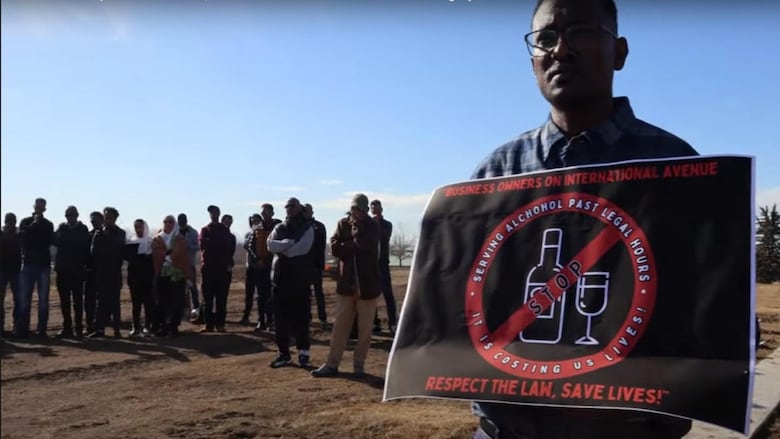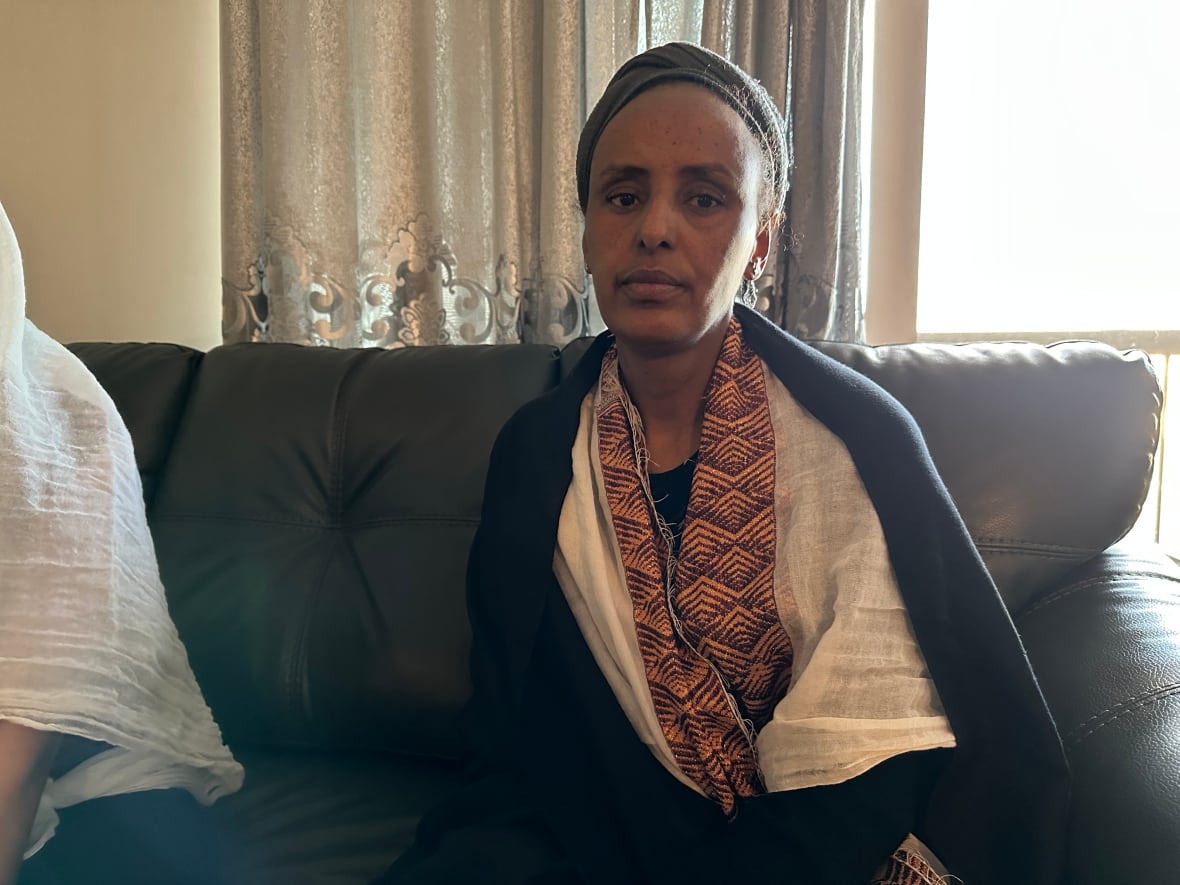Five young men killed in three years. Now Calgary is cracking down on after-hours liquor
Protesters called for better enforcement after the fifth death in February

Calgary police and bylaw officers are cracking down on alleged after-hours liquor service on International Avenue after the business district saw five violent early-morning deaths in three years.
The young men were either shot, caught up in fights or hit by vehicles in or around four restaurant-bars in the area — hours after Alberta's legislated 2 a.m. closing time.
Local Eritrean-Canadian community leaders blame after-hours parties and liquor service and have been lobbying police and local business leaders to make changes for years. But they say it took the most recent death — that of 24-year-old mechanic Adonai Tekle in February — to finally get action.
"Adonai's death made a lot of change. I always tell his mom," said Danny Egubat, a board member for the Eritrean Canadian Community Association of Calgary (ECCAC).
"I know it's not fair for his mom," he added. "He was the breadwinner. He just got married recently. It's not easy, when I see her pain."
Friends of the family organized a protest to coincide with his funeral. They held signs as they drove down 17th Avenue and at his gravesite. The signs read: "Business owners on International Avenue respect the law, save lives," and "AGLC, cease supplies to law-breaking bars."

Then they secured a meeting with the mayor, the police inspectors, the city councillor and top city administrators.
It's made a big difference, said Egubat, saying he's grateful for all those who finally took the issue seriously.
"They came up with a plan and then all departments started doing their job — AGLC, business licensing, police — all of them started doing their job," he said.
"We've been working hard for the last two, three years to get this and finally we got it done in a short period of time. We were able to bring everyone under one table to listen to our concerns."
Joint enforcement team steps up random inspections
Ryan Pleckaitis is the chief bylaw officer with the City of Calgary. He said his team hosted a joint townhall with Calgary police this spring, then stepped up inspections, including during the early morning hours.
Now investigations around several establishments are on-going and they've taken enforcement action.
Pleckaitis said the Black Pearl, formerly called Portico Lounge, now has several conditions attached to its business licence. Owners must ensure there's video surveillance at all times, there's security personnel after 9 p.m., must keep an incident log and turn that over to a police or peace officer upon request, and ensure all patrons are out of the business by 2 a.m.
"The teams are out at various times in the morning and making sure that these businesses are complying," he said.
"There's no reason why a restaurant needs to be open at 4 a.m. and converted into an after-hours event. Ideally, we like to see voluntary compliance, but if not, we have mechanisms to make sure that these businesses are operating within the rules and regulations."
Calgary police said it ran a targeted six-week blitz this spring, in addition to its work with the city team. In a emailed statement to CBC News, police said they did 230 checks, which resulted in 70 formal walkthroughs, $19,000 in fines, several two-day liquor licence suspensions, 28 warnings for violations and three court summons issued to bar or restaurant owners.
CBC News reached out to the four restaurants where violence happened and left letters with staff. No one responded for comment.
Five men killed were all recent immigrants
Community leaders say the trouble started on June 8, 2022, when Abraha Tesfatsion was found injured on the street near Portico Lounge just after 5 a.m. When he died, police categorized the incident as an "undetermined death" and community members raised funds to send his body back to Eritrea.
The second victim was Temesgen Tesfatsion, a 35-year-old father about to graduate as a heavy-duty mechanic. He was shot in the Ambassador Restaurant and Bar at 4:40 a.m. Police said it was a targeted shooting but Temesgen was not the intended victim.
The third victim was Samuel Haille, 24, who was killed when Yosief Hagos fired into a group of people from just outside Bella Restaurant and Bar. That shooting happened at 4:30 a.m. on Dec. 25, 2022, and Hagos was recently convicted of manslaughter.
The fourth victim was Awed Ghebremeskel, 32, who was also found outside the Portico Lounge, this time at about 5 a.m. on Sept. 4, 2024. Police said a fight happened outside the lounge and Ghebremeskel was hit by a vehicle.
The fifth victim, Adonai Teckle, was the main breadwinner for his mother and three siblings. The family left his father behind when they escaped on foot from Eritrea. He studied mechanics while living as a refugee in Ethiopia and then got a job here in an automotive shop. The 24-year-old was newly married.
His mother, Meaza Zerom, said they were called to pick him up from Hdmona Restaurant and told he passed out from having too much to drink. She said they weren't told there had been a fight, so they did not bring him to the hospital.
Police said he was trying to break up a fight when he was struck. That happened at 6:20 a.m. on Feb. 17.
"Adonia worked six days a week; he only had Sunday off. Usually on Sunday, he went to bars to relax with his friends," Zerom said, speaking through a translator.
"But I think the main issue here that government officials need to address is around those people who provide [alcohol when it's] not allowed. Because these youth, they are attending bars to just have fun. But if they are provided with [alcohol], definitely they will take it."

Alberta Gaming, Liquor and Cannabis or AGLC regulates liquor sales across the province. It says liquor sales must end by 2 a.m. In an emailed statement, AGLC spokes woman Karin Campbell said they are working with police to educate business owners.
Concerned the party could move underground
Coun. Gian-Carlo Carra is responsible for Ward 9, which includes International Avenue. He was invited to speak at Tekle's funeral.
He said he hopes city regulators will enforce existing rules, but also be open to broad discussions about how to socialize safely, even in the early morning if that's what people are seeking to do.
"My take on the issue is that it would be a very knee-jerk response to shut them down because we know that [underground] markets exist when there aren't [regulated] markets to respond to market demand."
"I'm much more interested in finding a way to regulate these businesses in a way that makes sense."
A traumatic journey to Canada
Community leaders say that to understand why these young people are at the bar, it's also important to understand the journey they took to come here.
According to the United Nations, Eritrea has one of the highest numbers of refugees per capita in the world, as people flee violence, detention without trial in military-run prisons and forced conscription. The Paris-based Reporters without Borders has ranked Eritrea as more repressive than North Korea.
Zerom said her son Adonai tried to escape when he was 16 with several friends. But they were caught and he spent six months in a military prison before he fled again with her.
From Ethiopia, her family was able to fly to Canada and be accepted as refugees. But many others face still more trauma as they shuffle between refugee camps, risk kidnapping and torture as they flee across the Sahara, or drowning on overcrowded boats on the Mediterranean.
Egubat said they're trying to raise funds to sponsor a psychologist from the Eritrean community in Ethiopia to come to Canada and support these refugees. That way the professional would speak the same language and understand their experience, and hopefully work on a pay scale these refugees can afford.
Adanech Sahilie is also supporting Zerom's family. She says she understands why young men and women want to socialize at the bar.
"There is a lot of untreated trauma they are experiencing and they don't have a way to vent it," said Sahilie, who works with Eritrean and Ethiopian community members as executive director of the Immigrant Outreach Society. She translated for Zerom during the CBC News interview.
She said when clients are in her office, they share stories of witnessing rape and murder, being tortured. They seem to hold it together while in the refugee camps, then the memories surface and they struggle to work through it as they settle into relative safety here.
But the bar owners need to be responsible for ensuring a safe, law-abiding space, she said.
"The government needs to be very strict [on the liquor rules]," she said. "Every six months, check. Random checks. This kind of death can be preventable, 100 per cent."